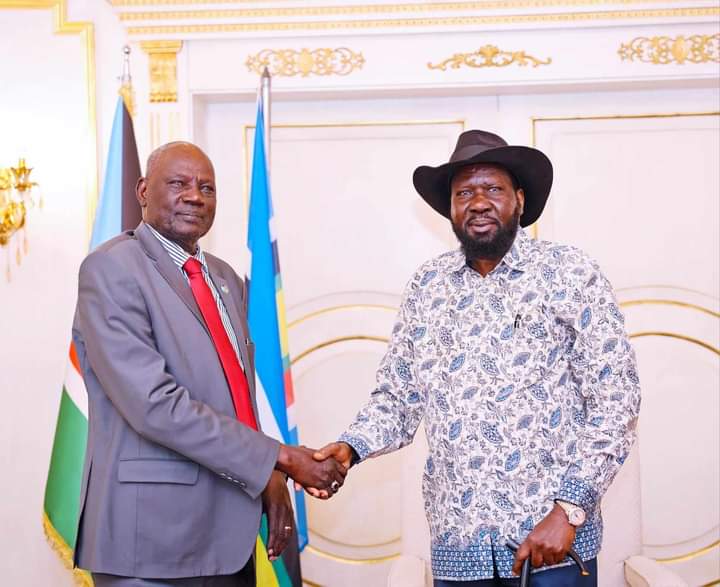South Sudan’s Information Michael Michael Makuei Lueth shaking hands with President Salva Kiir Mayardit. |Courtesy: Office of the President|.
By PaanLuel Wël
Sunday, 01 December 2024 (PW) – Let it be recorded in the annals of South Sudanese governance that when the Honourable Michael Makwei Lueth Kang was confronted with the public’s rightful outrage over telecommunication tariffs that would make even a highway robber blush, our esteemed Minister of Information boldly proclaimed, with the casual indifference of Queen Marie Antoinette, that citizens should simply stop using telephones if they found them too expensive.
The SPLM/SPLA revolution, as it turns out, may have delivered freedom but seems to have forgotten the fine print of the promises made during the liberation struggle. A government born of struggle, fed on sacrifice, and raised on the dreams of its people has been reduced to advising citizens to “stop using telephones” if they can’t afford the astronomically high tariffs. If anyone is “taking towns to the people” these days, it’s the telecom companies, and they’ve brought hefty invoices, not basic infrastructure.
Let us start, as all great grievances do, with the Honourable Michael Makwei Lueth, whose response to the cries of struggling citizens can only be described as a masterclass in missing the point. Faced with complaints about mobile tariffs that rival the GDP of small nations, Makwei quipped: “If you feel that you are being overcharged, you better refrain from using it… We are not overcharging; it is you who is overspending … If anybody is complaining about high mobile tariffs, refrain from using the telephone because it is not compulsory.”
Not compulsory? Well, neither is wearing clothes, but try suggesting that to the next person you meet on the street of Juba. Communication, like clothing, is no longer a luxury; it’s a necessity. In a world where economies run on connections and information is the currency of progress, advising citizens to simply ‘opt out’ is as absurd as telling a farmer to stop planting if he doesn’t like the price of seeds.
Now, if the Honourable Minister’s statement has caused us some consternation, imagine the consternation it would cause the late Dr. John Garang. Here was a man who saw liberation as more than just a flag and a national anthem. Dr. John Garang envisioned a South Sudan where revolution was not just about changing rulers but changing lives.
The SPLM/SPLA’s vision of ‘Taking Towns to the People’ was never about creating a government that tells its people to retreat and surrender, but one that advances the frontiers of human potential. “The revolution is meaningless,” Dr. John Garang thundered, “unless it makes our people happy, unless the masses of our people, as a result of our glorious revolution, become prosperous.” Prosperity that includes access to communication, one might add – not exclusion from it.
As Dr. John Garang himself prophetically warned, “Unless we provide these essential services to our people, unless the revolution provides these things to our people, then the people will prefer the government of the NIF that provide salt to the government of the SPLM that does not provide anything for its people.”
Dr. John Garang spoke of taking towns to the people, not taking phones away from the citizens. He promised a government that would transform bullets into books, guns into growth, and hardship into hope. Instead, we seem to have traded one kind of struggle for another—this time against our own leaders’ indifference. Is the Republic of South Sudan a textbook case of the same monkeys swinging in a different forest?
What would Dr. John Garang think of a government that dismisses the grievances of its citizens with the rhetorical equivalent of a shrug? He warned us of this very danger, saying: “If the SPLM cannot deliver anything and we just shout revolution, revolution… when the barest minimum of essential things of life are not available, then the people will drive us into the sea, even though there is no sea here; they will find one.”
Make no mistake: there is no shortage of seas to find, even in landlocked South Sudan. They are seas of frustration, seas of despair, and seas of unmet expectations. And judging by the Honourable Minister’s statement, our government is busy charting a course straight into their depths.
Dr. John Garang was a pragmatist, a man of action as much as vision. He understood that governance is not a God-given right but a contract—a deal between the leaders and the led. And like any deal, it has terms. The people work, the government delivers. Not delivering, Dr. John Garang warned, would doom the SPLM/SPLA-led government to the same fate as the Khartoum regimes we fought so hard to replace.
“We must depend on ourselves,” Dr. John Garang declared, “we must learn to rely on our own resources.” Yet how can citizens rely on their resources when government policy actively works to price them out of essential communication services?
Let’s not sugarcoat it: telling citizens to “stop using phones” when they can’t afford them is not leadership; it’s the political equivalent of a chef telling his diners to stop eating if they don’t like the food – or President Kiir telling Jieng Jonglei and Lou Nuer to stop keeping cattle if they don’t like Murle cattle raids. Governance is about solving problems, not sidestepping them.
In today’s world, connectivity isn’t a luxury; it’s a lifeline. It’s how Dinka and Nuer cattle keepers and farmers in Equatoria check market prices, students access education, and businesses grow. Dr. John Garang understood this need for empowerment. He urged us to build a nation on hard work and self-reliance, saying: “The only way to achieve strength as a nation is to be economically strong.”
But how can the people of South Sudan be economically strong when the tools of progress are priced out of their reach? How can they be self-reliant when even the act of making a phone call feels like a financial leap of faith?
Let’s be clear: the people of South Sudan are not asking for miracles. They are not demanding Amarat mansions or NilePet jobs or J-1 appointments —they are asking for the bare minimum of what any government should provide: affordable services, accessible opportunities, and a chance to build a better life.
If our leaders cannot deliver these basics, they should prepare for what Dr. John Garang called “intifadha.” For the people will not sit idle while their aspirations are reduced to a footnote in the annals of Salva Kiir’s South Sudan history. They will ask, as Dr. John Garang himself would undoubtedly say: “Where is the promise? Where is the vision?” of the liberation struggle?
So, to the Honourable Minister Michael Makwei Lueth and all who share his dismissive stance, let this serve as a reminder: governance is not about managing complaints; it’s about meeting them with solutions. Leadership is not about telling people what they can do without; it’s about providing what they cannot do without.
Dr. John Garang once said: “If we do not deliver on our promises, the people will drive us into the sea.” Perhaps it’s time for our leaders to dust off their swimming lessons because the tides of public frustration are rising and the leadership may be thrown into the deep Sea, into the Nile. For if we cannot afford the luxury of leadership, we surely cannot afford the cost of failure.




